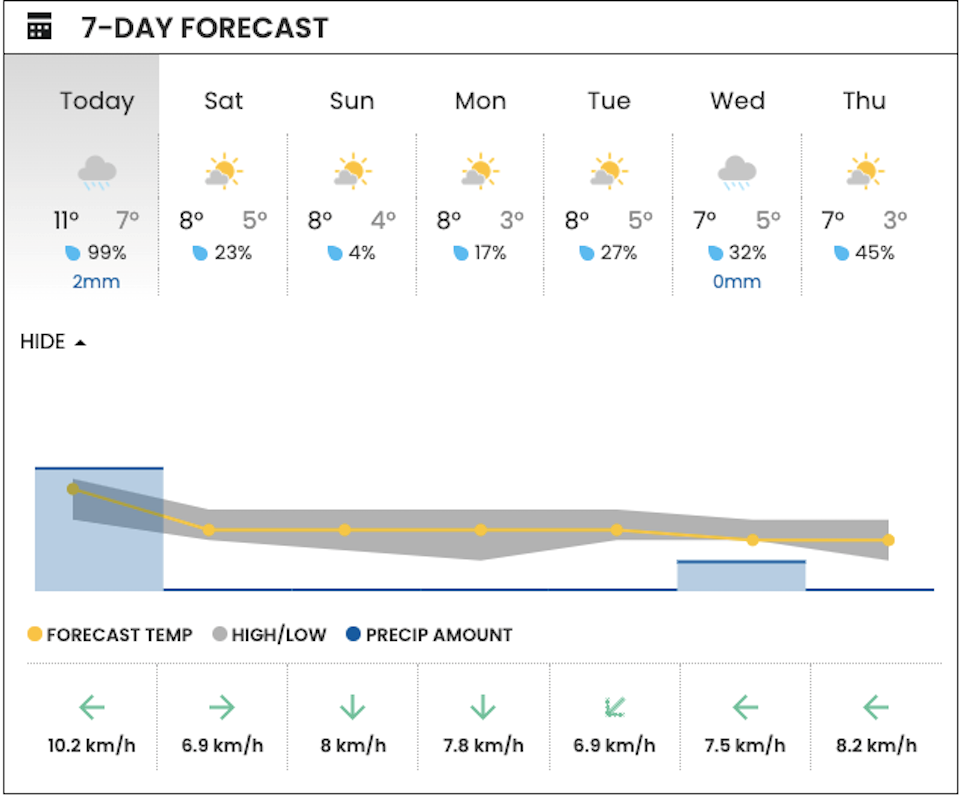The current Metro Vancouver seven-day weather forecast includes a shift from extreme temperatures to ones closer to the seasonal average.
The first couple of weeks of February should see temperatures close to the seasonal average, following a week of abnormal warmth and precipitation, Environment Canada meteorologist Derek Lee told V.I.A.
On Friday, Feb. 2, V.I.A.'s Downtown Centre Weatherhood station shows a forecast high of 11 C and an overnight low of 5 C, which are still significantly above seasonal averages (7.1 C and 0.9). Some light showers are also expected.
Temperatures should start to align with the seasonal average over the weekend. Conditions are also expected to be dry, offering a respite from a parade of storms that drenched the region over the past week, resulting in flood warnings, travel advisories, and power outages.
After the mid-way point of the month, temperatures should climb slightly above average, but Environment Canada isn't tracking any major storms. The Pineapple Express that just battered B.C.'s south coast has migrated down to California, causing widespread flooding.
But Metro Vancouver could see some surprises as winter continues, despite temperatures evening out.
Could Metro Vancouver see snow or extreme cold again this winter?
Increasing daylight means surface temperatures have more opportunities to warm up, meaning January's biting cold isn't as likely moving forward. That said, a blast of Arctic air could still make its way into the region.
Right now, cold air coming from the north is only impacting the B.C. interior but a stronger system could impact the Lower Mainland in the future as El Niño weakens heading into the spring, Lee noted.
While Environment Canada isn't expecting a blast of Arctic air over the next few weeks, one could still conceivably occur before the end of winter. Matched with precipitation, it could create another snow event.
"Snow typically comes in the first half of March -- as much as 15 - 20 cm of snow isn't rare," Lee explained. Snow events in Metro Vancouver after mid-March are quite rare, however, with only a couple of them on record.
January's Metro Vancouver weather included extreme highs and lows
While January's average temperature - the average of all of its daytime highs and overnight lows - was only 0.5 C below the seasonal average, the month was marked with record-breaking cold and heat.
January's average temperature at Vancouver International Airport (YVR) was 3.6 C; the seasonal average is only slightly higher, at 4.1 C, according to the department's historical climate data.
Environment Canada would typically classify the month's average temperature as about normal or just slightly below average -- but the unremarkable figure isn't representative of several extreme weather events, Lee explained.
YVR saw record-breaking cold on Jan. 13, with an overnight low of -13.7 C. The bone-chilling cold was accompanied by strong winds that made temperatures feel as cold as -20 C.
Just after the cold snap, traffic was grounded to a halt across the Lower Mainland as commuters battled just shy of 30 cm of snowfall during a potent winter storm.
To finish off the month, the region also experienced abnormal warmth. A high of 14.3 was recorded at YVR on Jan. 29, which is several degrees above the seasonal average of 7.1 C.
January also saw near-record-setting precipitation. A whopping 259.5 mm of it was recorded at YVR, which is roughly 50 per cent more than the seasonal average of 160.4 mm; it is the fifth wettest January on record.

Stay up-to-date with hyperlocal forecasts across 50 neighbourhoods in the Lower Mainland with V.I.A.'s Weatherhood.



